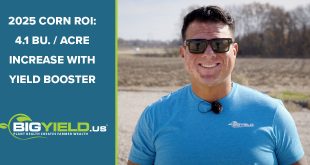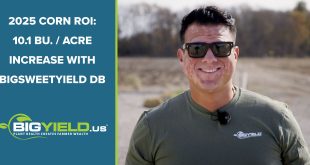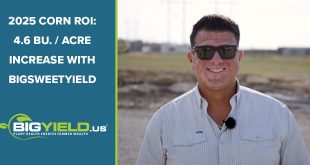
Landon Teal discusses how he uses drones in agriculture.
Listen to the BigYield.us team and Kyle Hill, Ag 1280 Farm Director, each Monday, Wednesday, and Friday on Ag 1280 KDKD-AM. The segments air at 7:15 am and again at 12:15 pm.
This segment originally aired on August 18, 2017.
Audio Transcript
Kyle: We’re back with another BigYield Spotlight. I’m Kyle Hill, visiting with Landon Teal of BigYield.us. Welcome back.
Landon: Thank you Kyle.
Kyle: Today we’re talking drones. It’s a big topic in this day and age. How are you guys using drones on the research farm?
Landon: We’ve really kicked off the drones not only this year, but in years past we started incorporating them into our process. What we like to do on the farm, we use the drones for a lot of our mapping. This gives us a visual over the top. We can go through after we’ve planted and after the crops are up. We’ll map a field and can go through and look at where we have had a planter skip, or see where pressures are already starting up. Along with that, after we get the map, we can look at a couple different aspects. We have the special sensors and imagery that we can use from that map that will give us your plant health. We can go through and see what plants need what, and what plots are lacking in some areas as far as nutrients. We can go out and check those fields from there. In the last couple years, we’ve done some elevation data mapping for the farm .That helped us in a lot of different ways like drainage and runoff and also irrigation. We do a lot of flood irrigation so it told us where we needed to put our risers so all the water was concentrated in the right area.
Kyle: You’ve been walking through a lot of fields Landon. How do these drones help you out as you are out and about?
Landon: Well the drone is just another tool that I get to use. It’s kind of like my shovel. I use it every day, for digging up plants. The drone I get to use every day and it’s nice because I can get up over the crop. Especially with corn right now. Not necessarily in the later stages, because I can’t do much this year, but I can look and plant for next year. During those vegetative stages, when it is hard for me to see across the field and see pressures, I am able to get over the crop and see what the field looks like over the top. It may sound silly, but that tool is something that a lot of guys underestimate how much can be seen as far as insect and weed pressures. That’s the biggest thing because especially in corn, you can walk down one row and can only see one or two rows over. But if you can get over top of that, you can see those weed pressures and do something about it.
Kyle: Now these drones don’t exactly come cheap. Are there cost effective units out there that you use and that folks can afford?
Landon: Yeah, for us at the research farm we’re paired up with AgTech. AgTech does a lot of the drone work for us. They really set up a nice package for a beginning farmer. We have guys that are older that come in and are able to use these, and we also have younger guys, still in grade school. We have guys like that that fly it for the farmer. These are really cost effective. They set up a nice package that provides your drone, training, support, and gives you a nice case. That way you invest in the product and you have something to protect it with.
Kyle: How do drones pay off for a grower?
Landon: They are a huge asset to a farmer. It allows a farmer to get up and allows him to make management decisions. That is something that a lot of guys overlook. They see it just as another toy to play with, but it can really be used as a nice tool for looking at a crop and also digging down deep and getting into higher management. You can map your fields and really get nutrient analysis and plant health. The biggest thing I think a lot of guys could benefit from is seeing there crop from above. That way they don’t find the problems when they are in the combine. If you have a drone, you are able to see these problems earlier.
Kyle: For anybody that has questions about drone use in their fields, or any of hte products and services you have available through BigYield, how can they get ahold of you Landon?
Landon: They can contact us online at www.BigYield.us, or give us a call at 816-773-6096, or stop by the research farm there in Garden City. Or they can get online and sign up for one of our farm tours from September 4th through the 8th.
Kyle: Those are coming up pretty quick. Landon Teal with BigYield.us. Good to visit with you.
Landon: Thanks Kyle.
 BigYield High Yield Soybeans, High Yield Corn, and High Yield Wheat
BigYield High Yield Soybeans, High Yield Corn, and High Yield Wheat



